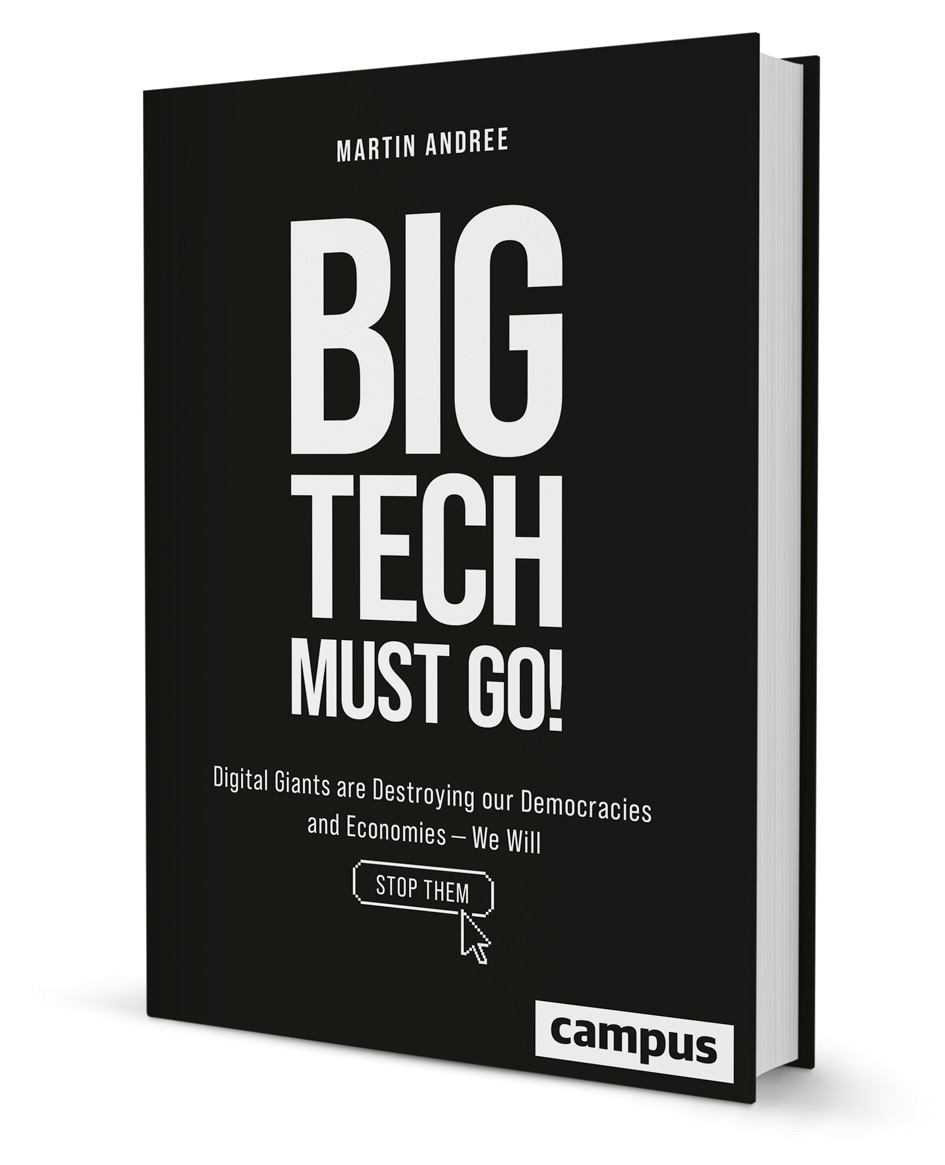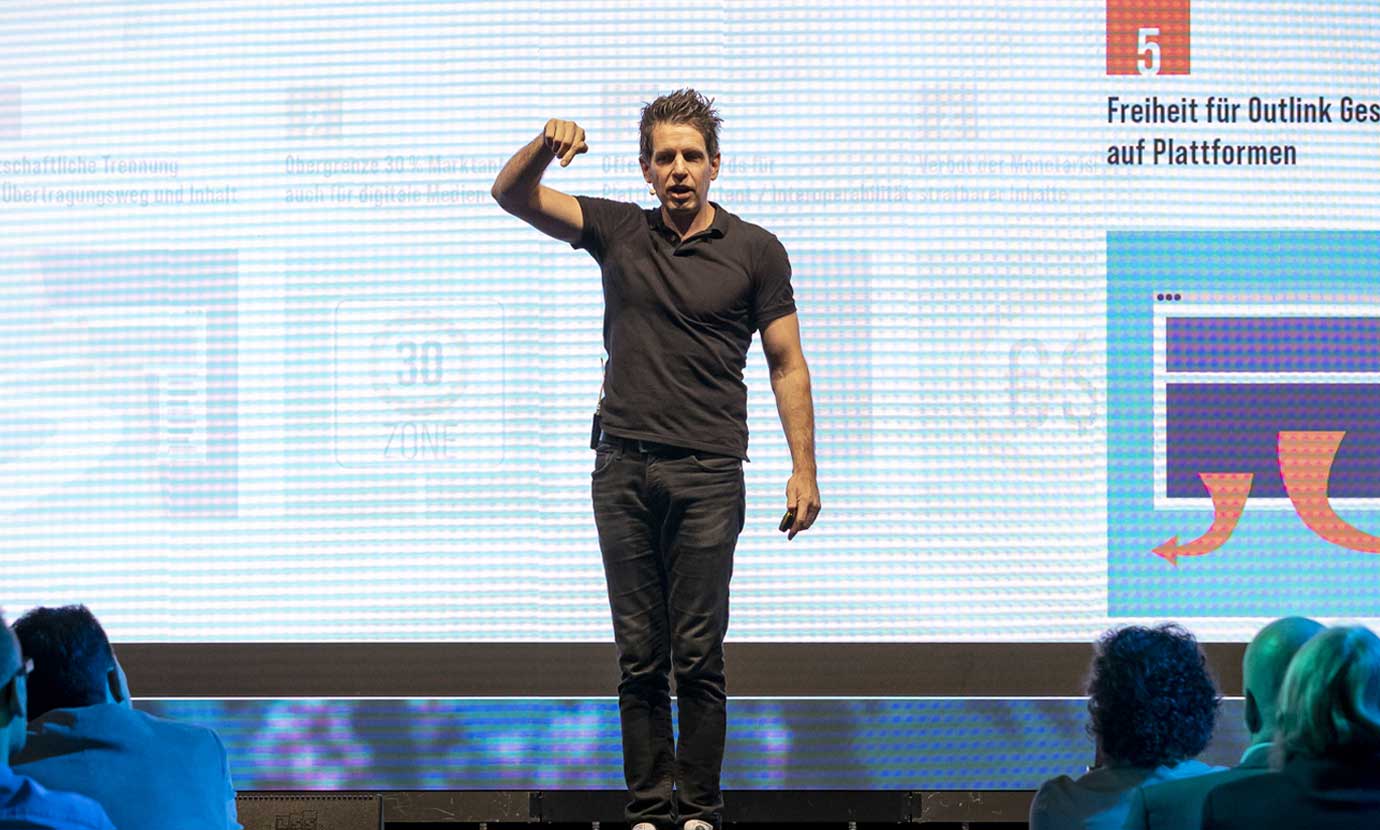

Book Publication
Big Tech
must go!
Digital Giants are Destroying our Democracies and Economies – We Will Stop Them
In bookstores from February 27, 2025
Frankfurter Allgemeine Sonntagszeitung
(leading German weekly newspaper)

Cicero
(German monthly magazine for political culture)

ARD
(public German television channel)

Deutsche Welle
(public German radio channel)

Welt am Sonntag
(leading German Sunday newspaper)

Computerwoche
(German weekly newspaper for CIOs and IT managers)

Die Welt
(German daily newspaper)

NDR
(public German television)

CORRECTIV
(leading German investigative journalism NGO)

CONTENT - AT A GLANCE
Digital monopolies shape ever larger parts of our lives. The platforms are increasingly controlling the public formation of political opinion and at the same time abolishing our free market economy. Digital expert Martin Andree shows in detail how far the hostile takeover of our society by the tech giants has already progressed - and how we could reclaim the Internet.
Huge debate in Germany
The German edition of „Big Tech must go!“ (released August 2023) sparked a huge debate about digital monopolies in Germany – including about one hundred events, interviews in television, radio and newspapers, press contributions, conference talks, panels and reviews. Most of them are displayed on the German website version (including links). As an exception in English, here is an international review done by „Deutsche Welle“ (public German radio channel).

SUMMARY
A handful of providers dominate the web
Our own extensive scientific measurements prove that the entire traffic on the German Internet is dominated by a handful of tech giants - Google, Facebook, Instagram, Amazon attract huge shares of usage. In contrast, the rest of the Internet is a gigantic graveyard where hardly any usage can be measured (for details, see the world’s first holistic media usage measurement done for an entire country, www.atlasderdigitalenwelt.de).

The end of the free Internet
These measurements show how far the digital corporations have already progressed in their hostile takeover. The free Internet no longer exists. The web used to be a structure of equal nodes in which you could move from one hyperlink to the next ("surfing"). But this pluralistic use no longer exists under the conditions of the platforms. It is a take-over in the literal sense: After all, Big Tech’s trick was to superimpose the platforms "over" the structure of the Internet. They now only use the formerly free web as infrastructure to suck up traffic from the web into their platforms - thus systematically drying up the rest of the Internet.

Digital media are leading media
Due to this hostile takeover of the internet, the monopolies of Big Tech are cheating on all of us without any exception. We are all victims of this process: The news media, creators, bloggers and digital enthusiasts, corporations, public broadcasting, and ultimately, all the people using the internet. The situation is most threatening for our media system: in a few years, the basis of our digital public that shapes our political opinions will be controlled by a handful of US-American platforms.
We can already recognize this dominance by analyzing the advertising investments. Advertisers are investing their money where the audience's attention is. And since 2020, advertisers have already been spending more money in digital media than in all analog media combined in Germany. Digital media have therefore long since been our leading media. According to current forecasts, the share of analog media will fall below 25% by 2029.

Platforms control the web
This is an important threshold, because by then at the latest, the journalistic power of the editorial media will be far too small to protest against the hostile takeover of our media system by the platforms. This is dramatic, because then the platforms will form the basis of our political public sphere. They will control our media system and can manipulate traffic and usage at will. Because we do not have access to the platform’s black boxes. Will our liberal media democracy be destroyed?

Hostile takeover of the economy
The book’s analysis shows in detail how the digital corporations have abolished the free internet: What permitted means, unfair tricks, and criminal methods have they used to establish their anti-democratic monopolies? Another particularly threatening aspect of the new digital feudalism is that more and more economic transactions are being carried out through online channels. As Big Tech's monopolies will dominate access to buying and selling for almost all market participants, they will be able to monetize ever larger shares of our economic value creation at will.

We can liberate the web immediately
However, Andree's book also shows that this digital feudalism is not God-given. As he aptly writes, we don't live in North Korea or China. Nothing can stop us from abolishing the status quo in a few months if we are really determined. Even more so, as 82% of all people reject the digital accumulations of power in Germany. Fortunately, Big Tech has no majority in the Western world. And unlike climate change, this problem would be ridiculously easy to solve.
That's why Andree turns the tables - after accepting the hostile takeover of the internet by digital cooperations for decades, there's nothing to stop us now using creativity and determination to liberate the web and reclaim it for the Western world. He outlines 15 bold actions we can take to quickly and immediately abolish the dominance of Big Tech. Because we still have a choice. We can save democracy and pluralism - if only we would dare to achieve a little digital revolution together.
Content
KNOCKOUT: How Big Tech is shutting down unpopular research 7
I.
GAME OVER 2029: The domination of the digital companies 13
- Our democracy is in danger 14
- The »point of no return« – 2029 19
- The internet of monopolies 26
- The victims: Journalism, bloggers, global brands, public broadcasting 35
- Fair and free competition has been completely eliminated 45
- Is it really so dramatic? 47
II.
The end of the free internet: How did the tech giants make it work? 57
- Stuck in the silos of the platforms 58
- When media are the private property of companies 66
- How Big Tech is expanding its monopolies 80
- Killer acquisitions 87
- Self-service for internet traffic 93
- Monopoly accelerator: Generative AI 98
III.
Hostile takeover: How digital superpower changes our entire society 101
- Death trap: The narrative of weak, vulnerable media 102
- How big tech will take over the economy 109
- Why politicians will be dependent on platforms in the future 122
- Mega-media are taking over our society 128
- Tech giants manipulate traffic 133
- Spying activities by Big Tech 138
- The principle of maximum takeover 143
IV.
MONOPOLIES, FAKE NEWS, HATE SPEECH: Is all this actually legal? 149
- Vacuum of law: Inadequate laws against monopolies 150
- Maximum profits for tech giants - without liability 168
- How we are imprisoned by the platforms’ legal systems 177
- Is the status quo unconstitutional? 182
- Conclusion: Goodbye democracy and media freedom 199
V.
ACCEPT HERE: Why nobody cares 205
- California Dreamin‘: The good beginnings 206
- Digital Darth Vaders dress up as a philanthropists 212
- The destruction of freedom in the name of freedom 219
- Promote versus punish: Big Tech‘s lobbying machine 227
VI.
COUNTDOWN 2029: How can we liberate the internet? 241
- A spark of hope: The people do not want Big Tech monopolies 242
- How we liberate the internet 246
- Seriously? 264
- A free Europe between US digital feudalism and China‘s online dictatorship 267
- Thanks 278
- Notes 280
ADDITIONAL BACKGROUNDS/ NOTES
Chapter I, Note 3 and Note 15
Even the latest diversity report by the state media authorities acknowledges that the Internet and television are now more or less equally important sources of information; in this study, digital media are already the clear leader among young target groups . Cf. Medienanstalten (ed.): Vielfaltsbericht der Landesmedienanstalten; download at https://www.die-medienanstalten.de/publikationen/vielfaltsbericht?tx_news_pi1%5Bnews%5D=5077&cHash=ae9e630d7bad5eca3086aea98ac0df55; see also Hein, David: "Internet und Fernsehen als Informationsmedien fast gleichauf". In: Horizont, 11/23/2022; https://www.horizont.net/medien/nachrichten/vielfaltsbericht-der-medienanstalten-internet-und-fernsehen-als-informationsmedien-fast-gleichauf-204375?utm_source=%2Fmeta%2Fnewsflash%2Fvor9&utm_medium=newsletter&utm_campaign=nl48092&utm_term=718e25e585446acad971d874e5178fc6
Over time, the Internet has been in the leading position here for the overall population since 2019 (which, incidentally, is remarkable consistent with our finding that digital media overtook analog in terms of advertising spend in 2020). This is remarkable in that the studies cited are surveys. In such surveys, however, people often tend to attribute a greater role to “traditional” media than is the case. This is simply because the Internet has long been devalued by social elites as a dubious source of news, and the current debates about fake news, hate speech and Internet propaganda have also left their mark on people. We can therefore assume that so-called "satisficing" shifts the results of such studies (see Bogner, Kathrin and Landrock, Uta (2015): Response tendencies in standardized surveys. Mannheim, GESIS Leibniz Institute for the Social Sciences (GESIS Survey Guidelines). DOI: 10.15465/gesis-sg_01; download at https://www.gesis.org/fileadmin/upload/SDMwiki/Antworttendenzen_Bogner_Landrock_08102015_1.1.pdf) – in favor of the socially desirable "traditional" media, which then appear stronger than they actually are. We can quantify such effects particularly well when determining the use of newspapers, for example - this "subjectively perceived" use can then be around 10 times higher than the actual circulation of the corresponding medium. "Satisficing" is particularly frequently observed in telephone interviews - and the surveys conducted to determine media diversity are also conducted/carried out by telephone. Precisely such studies are then often used by political decision-makers as a basis for decision-making. See, for example, an analysis commissioned by the Friedrich Ebert Foundation: " However, there are currently no worrying concentration trends in the market. In fact, Germany is in the 'green zone' here"; Zimmer, Anja: "Wie Medienvielfalt zukunftsfest machen? Building Blocks for Convergent Media Regulation." In: FES diskurs, March 2022; Download at: https://www.fes.de/medienpolitik/artikelseite/wie-medienvielfalt-zukunftsfest-machen-20-bausteine-fuer-eine-konvergente-medienregulierung; p. 8.
Chapter II, Note 8: Background to the various boycotts
Twitter boycotts occurred after Elon Musk's takeover of the network in late 2022; see Hurtz, Simon, "Advertise on Twitter? No, thanks." In: Süddeutsche.de, 11/15/2022; https://www.sueddeutsche.de/wirtschaft/twitter-elon-musk-werbung-boykott-spacex-1.5696378?reduced=true; retrieved on: 01/11/2023
At the beginning of 2021, a boycott against social media took place because more and more racist comments, hatred and hate speech had been observed on the platforms, in the context of the Premier Ligue;
Rieger, Maximilian: "Social media boycott of the Premier League"; in: Deutschlandfunk.de, 05/02/2021; https://www.deutschlandfunk.de/social-media-boykott-der-premier-league-jeder-muss-100.html; retrieved on: 01/11/2023
In 2020, #StopHateForProfit was a global boycott by advertising companies against Facebook's practice of not deleting controversial posts such as fake news, incitement to hatred, discrimination; see Hsu, Tiffany, and Eleanor Lutz, "More Than 1,000 Companies Boycotted Facebook. Did It Work?" In: nytimes.com, 10/05/2021; https://www.nytimes.com/2020/08/01/business/media/facebook-boycott.html; retrieved on: 01/09/2023
#MakeAmazonPay in the context of the Corona Crisis, early 2020: content is about poor treatment of employees as well as negative impacts on the climate; n.d.: Progressive.international "We are launching a planetary movement to #MakeAmazonPay", 12/09/2020; https://progressive.international/movement/campaign/make-amazon-pay-3bd28288-bed7-45a3-b053-b1d7111e416d/en; retrieved on: 01/10/2023)
Amazon Boycott on Prime Day: In mid-2019, an attempt was made to boycott Amazon on Prime Day. The aim was to draw attention to the poor working conditions in the company (see Hanbury, Mary: "People are urging boycotts of Amazon on one of its biggest days of sales". In: Businessinsider.com, 01/10/2023; https://www.businessinsider.com/people-boycott-amazon-prime-day-2019-7 retrieved on: 01/10/2023
#DeleteFacebook was the reaction of the net community to the Cambridge Analytica scandal in early 2018 - where millions of Facebook user data fell into the hands of Cambridge Analytica, which was then used for political advertising; cf. "Facebook-Cambridge Analytica data scandal"; in: wikipedia.org: https://en.wikipedia.org/wiki/Facebook%E2%80%93Cambridge_Analytica_data_scandal ; retrieved on: 01/05/2023
#AdBoycottYouTube: At the beginning of 2017, well-known companies boycotted Google or YouTube because it happened again and again that commercials appeared in the environment of racist, homophobic, or extremist content (cf. Lewanczik, Niklas: "Google-Boycott: Werbestopp bei YouTube breitet sich massiv aus". In: Onlinemarketing.de, 03/27/2017; https://onlinemarketing.de/social-media-marketing/google-boykott-werbestopp-youtube; retrieved on: 01/03/2023
#BoycottSnapchat 2017 was a reaction to the new map feature that allowed tracking of personal whereabouts; cf. Solon, Olivia: "Snapchat's new map feature raises fears of stalking and bullying"; In: The Guardian, 06/23/2017; https://www.theguardian.com/technology/2017/jun/23/snapchat-maps-privacy-safety-concerns; retrieved on: 01/05/2023
#UninstallSnapchat 2017 was a reaction against a discriminatory statement by Snapchat CEO Evan Spiegel; cf. Seyffarth, Moritz: "How Snapchat is turning an entire country against itself". In: Businessinsider.de, 04/18/2017; https://www.businessinsider.de/gruenderszene/allgemein/snapchat-uninstallsnapchat/; retrieved on: 01/05/2023
The boycotts by Kim Kardashian, Leonardo DiCaprio, Jennifer Lawrence and other celebrities in mid-2020 were activities in the context of the Facebook boycott #StopHateForProfit; cf. o. A.: "Celebrities boycott Facebook"; in: zeit.de, 09/16/2020; https://www.zeit.de/digital/internet/2020-09/soziales-netzwerk-facebook-boykott-kim-kardashian; retrieved on: 01/11/2023
Neil Young boycotted Spotify in early 2022 because the platform uncritically offered Joe Rogan's podcast, in which, among other things, false factual claims about corona cures as well as racist insults were spread; cf. Magoley, Nina, and Martin Fehrensen: "Spotify als Plattform für Coronaleugner?" In: Deutschlandfunk.de, 01/26/2022; https://www.deutschlandfunk.de/wie-kontrolliert-spotify-seine-inhalte-100.html; retrieved on: 01/12/2023
Rihanna called for a boycott of Snapchat in March 2018 because an ad glorifying violence had been shown on the network, which referred to Rihanna; cf. o. A.: "Rihanna calls for boycott of Snapchat"; in Vogue.de, 03/16/2018; https://www.vogue.de/lifestyle/artikel/rihanna-snapchat; retrieved on: 01/04/2023
lton John, Jim Carrey, Shonda Rhimes, and other celebrities quit Twitter after Elon Musk takeover in late 2022; see Nolan, Beatrice, and Jordan Hart, "Elton John, Jim Carrey, and Adam McKay are among the latest celebrities announcing they quit Twitter after Elon Musk takeover"; in businessinsider.com, 12/20/2022; https://www.businessinsider.com/shonda-rhimes-celebrities-leave-twitter-elon-musk-takeover-social-media-2022-10 ; retrieved on: 01/12/2023
Chapter III, Note 5
Facebook already has the Marketplace, where providers can sell directly; the commission is 5% of sales. The company also offers Meta Pay as a payment option on Facebook, Instagram and Whatsapp, although the service is currently only available in the USA. It is a kind of wallet in which payment options can be stored. See Facebook: "Meta Pay is an easy, secure way to pay in more places than ever"; https://pay.facebook.com/; retrieved on: 01/13/2023
Instagram Checkout is a feature that allows you to make purchases without leaving the Instagram app, the commission is the same as on Facebook. Further, it has a store page that displays personalized products and either redirects to the seller's website or redirects to Instagram Checkout (here, 5% of each sale goes to Instagram as a sales fee). Cf: Instagram: "Introducing Checkout on Instagram"
https://about.instagram.com/blog/announcements/introducing-instagram-checkout?igb_blog_shops_launch; retrieved on: 01/13/2023; cf. The Verge: "A guide to platform fees"; https://www.theverge.com/21445923/platform-fees-apps-games-business-marketplace-apple-google; retrieved on: 01/13/2023
The TikTok Shop works similarly to Instagram Checkout, meaning you can buy products without leaving the app. Cf. Hootsuite, "How to Sell Products on TikTok in 7 Easy Steps."
https://blog.hootsuite.com/how-to-sell-on-tiktok/; retrieved on: 01/13/2023; TikTok: "TikTokShop, Where Entertainment Meets Commerce"; https://shop.tiktok.com/business/en.
Chapter III, Note 15
According to the published information, revenues are distributed as follows:
- Apple (2021): Americas: 41.9%, Europe: 24.4%, China: 18.7, Japan: 7.8%, Rest v. Asia-Pacific: 7.2%; cf. "Revenue of Apple by geographical region from the first quarter of 2012 to 4th quarter 2022"
In: statista.com, 11/10/2022; https://www.statista.com/statistics/382175/quarterly-revenue-of-apple-by-geograhical-region/
- Amazon (2020): U.S.: 68.3%, Germany: 7.7%, UK: 6.9%, Japan: 5.3%, Rest of World: 11.9%; cf. Zaveri, Bhavya: "Amazon's Revenue By Region (2013-2021)" In: businessquant.com; https://businessquant.com/amazon-revenue-by-region
- Alphabet (2021): U.S.: 46%, EMEA: 31%, APAC: 18%, Rest of Americas: 5%; cf. "Revenue distribution of Alphabet from 2015 to 2022, by region"; In: statista.com, 02/13/2023;
https://www.statista.com/statistics/266250/regional-distribution-of-googles-revenue/
- Meta (2021): USA & Canada: 43.7%, Europe: 24.6%, Asia-Pacific: 22.7%, Rest of World: 9%; cf. "Facebook Revenue by Geography"; in: statistic.com, 04/11/2022; https://statstic.com/facebook-revenue-by-geography/
- Microsoft (2021): USA: 49.9%, Rest of World: 50.1%; cf. "Microsoft Annual Revenue by Geography: Fiscal 2002 - 2021"; in: dazeinfo.com, 08/20/2021; https://dazeinfo.com/2019/11/11/microsoft-revenue-by-geography-by-year-graphfarm/
Chapter IV, Note 12
There are no signs of any serious setbacks in Big Tech's sales growth.
Cf. Statista: "Microsoft Corporation revenue in fiscal years 2002 to 2022"
https://de.statista.com/statistik/daten/studie/155707/umfrage/entwicklung-des-umsatzes-der-microsoft-corporation-seit-dem-geschaeftsjahr-2002/; Statista: "Revenue of Meta worldwide in the years 2005 to 2022"
https://de.statista.com/statistik/daten/studie/193380/umfrage/umsatz-von-facebook-weltweit/; Statista: "Revenue of Amazon worldwide in the years 2004 to 2022"
https://de.statista.com/statistik/daten/studie/75292/umfrage/nettoumsatz-von-amazoncom-seit-2004/; Statista: "Annual revenue of Google from 2002 to 2021"
https://www.statista.com/statistics/266206/googles-annual-global-revenue/; Statista: "Annual revenue of Apple Inc. worldwide from 2004 to 2022"
https://de.statista.com/statistik/daten/studie/39388/umfrage/umsatz-von-apple-seit-2004/

Chapter IV, note 33
Cf. the detailed background provided above on Chapter I, note 3 and note 15.
Contact
If you are interested in interviews, guest contributions, etc., please contact Campus Verlag,
Inga Hoffmann
hoffmann@campus.de
Phone: +49 (0)69 97651621

